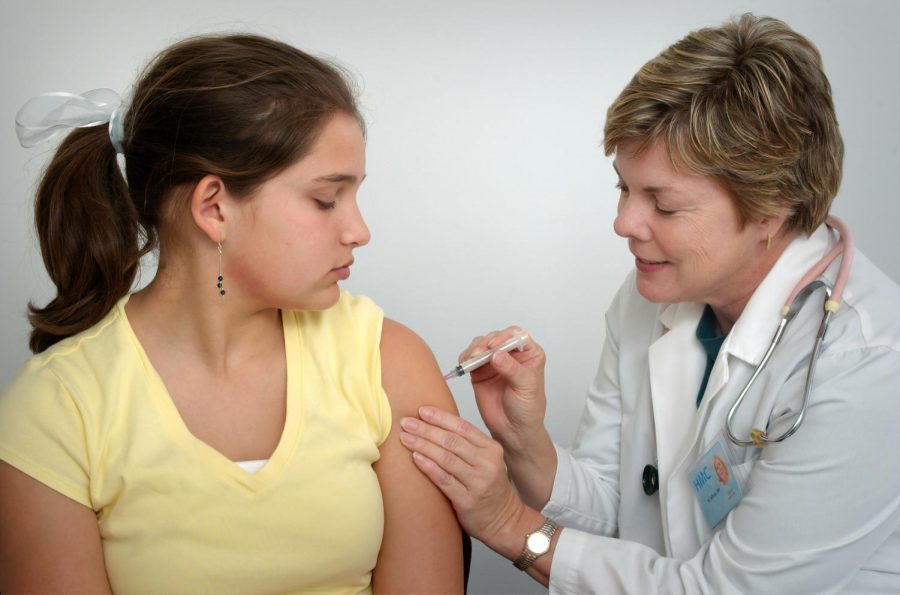PCP: Should OPRF mandate vaccines?
PRO by Holden Green, Photo/Graphics Editor
OPRF should mandate the COVID-19 vaccine for all eligible students and faculty who want to be in the building this fall. While there are some compelling arguments against mandating the vaccine, the protections it offers far outweigh any potential concerns.
Mandating vaccines would be nothing new for OPRF, nor would it be new for nearly any other public school in the country. Nationwide, every single state has vaccination requirements for students entering school.
For OPRF students specifically, there are vaccination requirements for students entering both their freshman and senior years, as well as specific medical examinations that must be completed to enroll at the high school.
These requirements make sense; requiring students to prove they are vaccinated against certain preventable diseases is an easy and simple requirement for most students to complete, and it ensures that, even if a case of one of these diseases entered the school, it would not spread rapidly and cause an outbreak.
It is precisely because we could not be vaccinated or otherwise protected against COVID-19 last spring that OPRF had to transition to 100 percent remote learning. If we had tried to keep school running in-person, with the roughly 4,000 people coming into the building every day, it is all but certain there would have been an outbreak, and many people would have gotten sick as a result.
Of course, because the vaccinations being administered in the United States are only authorized via Emergency Use Authorization, public schools and health departments cannot yet require them. However, public school districts nationwide are coordinating with local health departments and pediatricians to determine when/if a COVID-19 vaccination can be required.
Also, the announcement from the FDA on May 10 that the Pfizer-BioNTech vaccine was approved via Emergency Use Authorization for 12 to 15-year olds means nearly every single student and faculty member at OPRF this fall would be eligible to receive the vaccine.
Students and faculty want to be back in school. Nobody wants to prolong the current remote/hybrid situation, and everyone knows the most productive learning environment doesn’t include Zoom links and breakout rooms. Requiring everyone to be vaccinated against COVID-19 before the upcoming school year is a step that OPRF will likely soon be able to take, and one that can only benefit the school community, especially as we collectively navigate the upcoming return to our “new normal”.
CON by Jackson Hassler, Staffer
Although OPRF can encourage students to get vaccinated against COVID-19, doing so should not be mandatory for in-person instruction.
Even without a mandate, we have reason to believe most people will get the vaccine. Oak Park and River Forest are left-leaning communities in Democratic Cook County (in which Joe Biden won almost three-quarters of the 2020 presidential vote). A February survey conducted by Pew Research Center found 83% of Democrats said they had gotten a vaccine or intended to (59% of Republicans said the same thing.)
As for those who aren’t getting it, they may have valid ethical and safety-related hesitancies regarding these vaccines.
Now, don’t get me wrong, I’m not anti-vaccine, and have received both doses. However, we should not force people to choose between continuing remote learning and getting a vaccine they don’t trust.
While the Centers for Disease Control and Prevention (CDC) states that “COVID-19 vaccines are safe and effective”, they have only been in use since last December. We do not know what long-term effects they may lead to. While I’m not personally very concerned about this, I understand not everyone will share my view.
Top reasons cited by survey respondents who don’t want to get a COVID vaccine are “concern about side effects”, “the vaccines were developed and tested too quickly”, and that they “want to know more about how well they work”.
The National Conference of State Legislatures (NCSL), a Denver and DC-based nonpartisan organization that says it “represents the legislatures in the states, territories and commonwealths of the U.S”, reports that 44 states (including Illinois) allow religious exemptions from school vaccine requirements. Any religious objections that come up should be honored by the school. The NCSL also states that “At this time, no state requires children to receive the COVID-19 vaccine for school entry.”
Many have had the opportunity to get vaccinated already, or will in the next few months. The Cook County Department of Public Health reports that, as of May 20, half of the county’s suburban population has had at least one dose of a COVID vaccine. This number will continue to increase, especially as younger kids become eligible. COVID presents a low risk to most teens as well as most people vaccinated against the virus.
The school has not proven to be a very risky environment, and as more students get vaccinated, it will become even safer. OPRF has only had one outbreak (defined by the Illinois Department of Public Health (IDPH) as “five or more cases that may have a shared exposure on school grounds and are from different households”) with five linked cases of COVID-19, and no other documented transmissions, Executive Director of Communications & Community Relations Karin Sullivan and Head School Nurse Julee Terretta said.
Finally, we have other methods of increasing vaccinations while still respecting individual rights. Walk-in vaccination clinics have been made available. Physicians and pediatricians could reach out to their patients to discuss vaccination. Volunteers could help people get signed up. Dr. Allison Arwady, Chicago Department of Public Health (CDPH) commissioner, even suggested that laundromats, grocery stores, and nightlife activities could be utilized to aid in getting people vaccinated.
To those passionate about getting more people vaccinated: have a conversation with your friends about it. Give information to those hesitant to receive it. Encourage them to speak with their doctor. We should respect students and their families’ COVID vaccine choices made with the information given to them.



